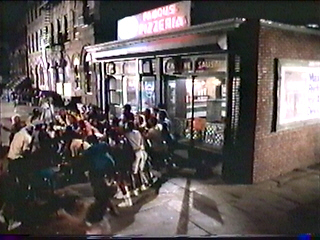|
THE 100 GREATEST MOVIE SEQUENCES OF ALL TIME Return to Main 100 Sequences Page | Enter Your Choices! |
|
|
100 99 98 97 96 95 94 93 92 91 90 89 88 87 86 85 84 83 82 81 80 79 78 77 76 75 74 73 72 71 70 69 68 67 66 65 64 63 62 61 60 59 58 57 56 55 54 53 52 51 50 49 48 47 46 45 44 43 42 41 40 39 38 37 36 35 34 33 32 31 30 29 28 27 26 25 24 23 22 21 20 19 18 17 16 15 14 13 12 11 10 9 8 7 6 5 4 3 2 NUMBER ONE
The eruption of racial violence at the ending
This film by director Spike Lee was one of the most powerful and socially important films of all time. The film's story, showing the racial strife in one small New York City suburb, tells its story during one day. From the time the people in the town wake up in the morning, throughout the day the tension builds from all sides for a race war. And finally, by the time night has fallen, Radio Raheem pushes Sal (played by Danny Aiello) just too far, and the violence erupts. Because the tension and the violence have built so steadily and slowly through the film, this sequence is mesmerizing to watch, as we realize the true problems of race relations in America. When the white policemen arrive, the situation only gets worse, as we see scenes that remind us of real life violence against blacks, back in the 60's in Birmingham, Alabama and times since then. Radio Raheem ends up dead, and an angry and hurt black neighborhood attack Sal's Pizzeria, and Spike Lee's character, Mooky, who tried to keep the peace all day and who works for Sal, is the one who starts it, throwing a garbage can into the window. They torch the pizzeria while Sal can do nothing but watch. Anger finally subsides as people can't really say anything -- we simply see the destruction, and we wonder will the situation ever improve? Will there ever be harmony among the races? It's a stunning piece of film from one of our most talented and bold filmmakers, Spike Lee. He doesn't take sides, he simply presents what is, and like an intelligent film should, it leaves the audience with some tough questions to answer. |


